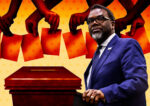Mayor Brandon Johnson is firing back at a recent analysis by the Civic Federation that highlights “serious concerns” about Johnson’ proposal to raise property transfer taxes on high-end deals in an effort to combat homelessness.
The Civic Federation, a fiscal watchdog group, scrutinized the potential drawbacks and a lack of clarity in the tax hike’s objectives. The nonpartisan group emphasized the necessity for more comprehensive information and analysis regarding the policy’s implementation and its ramifications on the local economy.
The fate of Johnson’s proposal, called Bring Chicago Home, is in the hands of voters, as it will appear on the March 19 ballot following real estate trade groups’ loss in court with their attempt to block the measure.
The Civic Federation echoed concerns raised by opponents of Bring Chicago Home, including the absence of specific spending goals for the generated revenue and inadequate integration with existing housing programs.
The plan calls for a tiered structure in which the transfer rate would jump from 0.75 percent to 2 percent for sales between $1 million and $1.5 million, while rising to 3 percent for transactions greater than $1.5 million. The rate would drop to 0.6 percent for property trades less than $1 million.
“On the revenue side, there has been no analysis and no accountability and no seeming consideration for the potential adverse consequences here, given the state of the real estate market, especially downtown, and given the fact that there are all sorts of avoidance behaviors that we have seen in other cities,” Civic Federation president Joe Ferguson told Crain’s.”
Despite acknowledging some benefits of the proposal, the Civic Federation cautioned against the city’s reliance on a potentially volatile revenue source, particularly amid ongoing challenges facing commercial real estate post-pandemic. With downtown retail and office vacancy rates at record highs, the group underscored the need for a more comprehensive approach.
In response to the group’s analysis, the mayor’s office issued a statement defending the proposal. It stressed that more than 68,000 Chicagoans are currently experiencing homelessness or unstable housing situations and that the city needs a larger revenue stream devoted to this specific issue.
In regards to how the funds will be implemented, the mayor’s office emphasized the need to preserve and expand housing stock for extremely low-income residents. In addition, the extra tax revenue would bolster existing services, including those provided by the Department of Family and Support Services and the Department of Housing, to provide rental assistance and permanent affordable housing, it said.
Moreover, the city’s budget director, in collaboration with relevant departments, would determine a maximum spending limit for funds stemming from Brind Chicago Home. The commissioner of Family and Support Services would closely monitor the progress of the policy’s impact on addressing homelessness, allowing for adjustments and a more focused approach over time.
The mayor’s office also contended that there’s not enough evidence to suggest that a “one-time marginal tax at point-of-sale” would have a detrimental effect on the real estate industry, citing the array of factors that contribute to a volatile market.
While Johnson’s progressive policies have irked much of the real estate community, the mayor’s office referenced a recent proposal that paints him in a more positive light from the industry’s perspective.
Johnson is working on plans to streamline the city’s arduous development approval process, with potential measures including consolidating development review commissions, increasing staffing, investing in technology and appointing a dedicated coordinator to enhance the efficiency of obtaining building permits.
Read more



